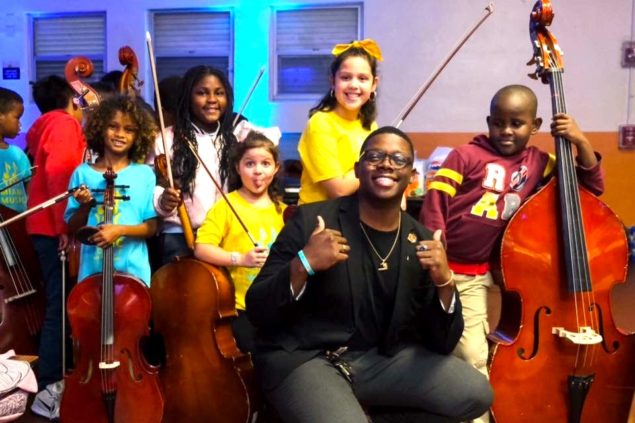|
Getting your Trinity Audio player ready...
|

Like a conductor stepping up to the podium and tapping his baton, Claudens Louis starts his day by turning to face the cacophony of change and confusion that COVID-19 has brought to his community.
But instead of a baton these days, he is using a different instrument in his mission to transform young people’s lives — technology.
As a site director of the Miami Music Project’s Little Haiti Chapter, Louis and the staff of this popular afterschool music program in Little Haiti normally would be meeting face-to-face to monitor student progress and keep tabs on whatever else is going on in their lives — five days a week.
But in the age of coronavirus, all that has changed. The Miami Music Project team has learned to adapt to the impact of the virus on the community by using FaceTime, texts, phone calls, or any other technology that’s available in their students’ households.
And over the past few weeks, they have even started offering an online virtual learning format until schools reopen, while also envisioning their summer music camp to also be online.
Challenging times
“Because this program is as much about music as it is about social engagement with our students and their families, we dedicate the better part of our day keeping in close contact with our kids — all 115 of them,” Louis said.
The Little Haiti Chapter is one of five Miami Music Project community-based sites to work as an official partner with the Miami-Dade County School District.
“These are tough times, to say the least, for kids forced to be distancing at home, surrounded by all kinds of distractions, family struggles, and anxieties. But helping to smooth out the difficulties they face day-to-day is what our program mission has been all along,” he added, “Just not to this extent, but we’re committed to doing it!”
With no barriers of race or economic status, the Miami Music Project serves as an instrument for social transformation in underserved communities by creating opportunity and access through its professionally staffed and managed after-school programming. And it’s totally free.
National model
According to Anna B. Klimala, president of Miami Music Project, the award-winning program has emerged as a model for music education programs nationally by reaching more than 30,000 children and youth since its launch here 11 years ago.
“Our program empowers children to acquire values and achieve their full potential, which in turn, positively affects society through the study and performance of music,” said Klimala, a music educator, activist — and a double-bassist herself.
“But these are unprecedented times,” she added. “Because of the fact that the children of the Miami Music Project belong to the demographic hardest hit by the pandemic, our worries are for families, and how we can help them through this time.”
Outreach works
Just off the phone with the Deklavon family, one of dozens of calls to make on this day, Louis said he was checking in on the two Miami Music Project students in the household, and to see how the whole family was doing.
Fourteen-year-old Elizabeth talked about how she is practicing her cello daily.
“She’s taking it very seriously, so that she will not lose what she has gained through the program,” her mom, Donna, explained.
Donna’s other child in the program, Theodore, has special needs and absolutely loves playing the trumpet.
“It is building his confidence and boosting his self-esteem,” she said. “We’ve all been working hard at making sure they get their practice in, to maintain what they have achieved at home during this crisis.”
A crucial connection to what used to be, as Louis puts it, “They are clinging to the music.”
For information or to donate to Miami Music Project, visit miamimusicproject.org.





